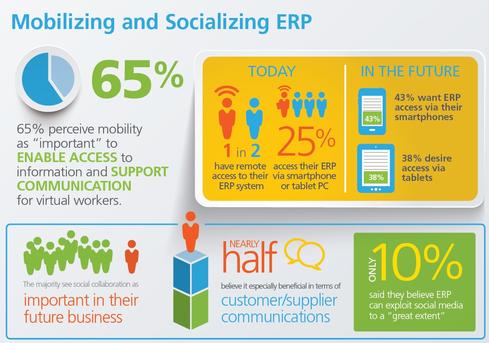An Epicor study reveals users are frustrated with inaccessible, inflexible ERP. Here's what incumbents Epicor, Infor, Microsoft, Oracle, and SAP are doing about it.

The majority of companies running ERP systems rate them as "basic" or "adequate," according to a just-released survey sponsored by the ERP vendor Epicor. What users want, according to the study, are more flexible and accessible ERP apps that will enable many employees to access information via smartphones and tablets.
It's no revelation that many incumbent ERP systems are used only by a few power users who can deal with wonky, dated screens from within the corporate network. But for the record, only 25% of the 1,509 respondents to Epicor's survey, which was conducted by the independent firm Redshift Research, had access to ERP via smartphones, and only 21% said they have access via tablets.
What's on the short list for future ERP implementations? The five "most important consideration[s] for future ERP implementations," as ranked by survey respondents, are:
Fast time to value
Simplicity for all users
Easy collaboration with customers, suppliers, and employees
Mobile access for all employees
A choice of on-premises, cloud, or hybrid deployment approaches
[Want more on Epicor 10? Read Epicor Overhauls ERP For Cloud, Mobility.]
Epicor was quick to explain how its own Epicor 10 release, launched this year, meets many of these sought-after characteristics. "We re-architected [Epicor 10] to make it a lot easier to deploy and run on any device, and we added social enterprise features to make ERP work for people who want to collaborate and monitor what's going on," Erik Johnson, Epicor's vice president of technical strategy, said in a phone interview with InformationWeek.
ERP is great for top-down process control, but social features help people cope with exceptions and be more agile, Johnson said. "The need for social features is more acute with ERP because it cuts across all departments. Much as vendors have tried with attachments, email threads are too difficult to tie to data. CEOs don't always get social, but if you put it in the product, a community will eventually emerge."
Of course, Epicor is not alone in joining collaboration with ERP. Infor introduced its Ming.le social app in 2013, the same year Microsoft started infusing its Dynamics ERP and CRM apps with social functionality gained through the acquisition of Yammer. ERP incumbents Oracle and SAP had previously added social and collaborative options through Oracle Fusion ERP and the Jam collaboration system that emerged from SAP's acquisition of SuccessFactors and its Cubetree system.
ERP vendors have also introduced wave upon wave of mobile apps, some native, some browser-based, some process-specific, and others broad-based. Understanding the importance of mobile support, even Microsoft has broken down and offered iOS and Android apps in addition to support for Windows Mobile apps.
With Epicor 10, the vendor has moved away from purpose-specific apps, favoring instead self-service web dashboards and customizable data-entry forms.
"We think the right strategy for ERP is to make it easy for users to surface the data and the transactions that they want to see," said Johnson. "They can click into the transactions and do the business tasks that they need to perform."
There are purists on both extremes of today's deployment debate, with 20% of respondents stuck on on-premises exclusively and another 20% preferring cloud-based ERP, but 44% say they prefer "a combination" (23%) or "a choice" (21%) of both approaches. Most ERP vendors now offer a choice of on-premises, private cloud, and public cloud services, though Infor, Microsoft, Oracle, and SAP offer only selected ERP systems as public cloud services. Epicor 10 supports all three deployment models on a single code base, according to Johnson.
"Non-manufacturing companies are definitely more biased toward the cloud," he said, acknowledging that that's where Epicor goes up against NetSuite and, in some cases, Workday. "Where you also see demand for cloud increasing is at the bottom of the market, where you see small shops that don't want to run infrastructure, and at the top of the market, where multinationals are buying plants and companies and want to get them up and running in the cloud." In the latter scenario, it's a two-step ERP deployment with corporate most likely running SAP.
"The grand middle" tends toward on-premises or hybrid deployments because "they're used to buying on capex terms, they have infrastructure and IT in place, and they have a ton of integrations," said Johnson.
Cloud-based ERP has yet to really move beyond the midmarket, with the vast majority of ERP deployments still being on-premises. Workday and NetSuite have arguably had the most success in scaling up multi-tenant, public cloud ERP, but even these two companies have barely cracked the Fortune 500 and Global 2000 with core financials deployments.
Integrating your private cloud with public clouds can provide agility, security, and control. But getting the minutia right is daunting. Get the new Hybrid Cloud: Details Matter issue of Network Computing Tech Digest today (free registration required).
About the Author(s)
You May Also Like







